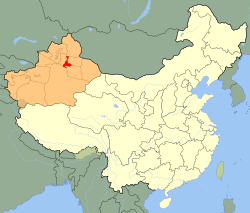| 1992 Ürümqi bombings | |
|---|---|
 Location of Ürümqi in China | |
 | |
| Location | Urumqi, Xinjiang, China |
| Date | February 5, 1992 (UTC+08:00) |
Attack type | Bombings |
| Deaths | 3 |
| Injured | 23 |
| Perpetrators | Uyghur separatists |
| Motive | Xinjiang conflict |
On 5 February 1992, four bombs exploded in public buildings and on two buses, line 2 and line 30, in Urumqi, Xinjiang, China. The bombings resulted in three deaths and 23 injuries.